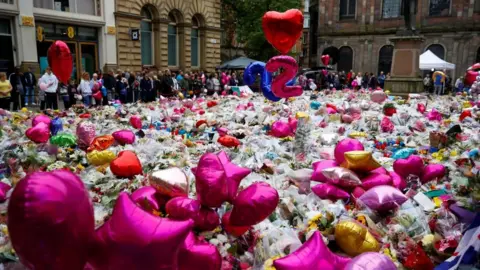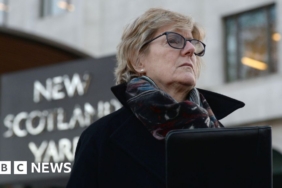Kaynak: www.bbc.com

 PA Media
PA MediaMI5 showed “institutional defensiveness rather than candour” after the Manchester Arena attack and for years continued to present an “inaccurate picture” of what it had known about the suicide bomber, a tribunal has been told.
Twenty-two people died and hundreds were injured when Salman Abedi detonated a homemade device at the end of an Ariana Grande concert on 22 May 2017.
More than 250 people who were either bereaved by the bombing, or survived it, are suing MI5, MI6 and GCHQ at an Investigatory Powers Tribunal (IPT) being held at the Royal Courts of Justice in London.
Neil Sheldon KC, representing the security services, argued the claimants’ characterisation was “not fair”.
‘Inaccurate picture’
Last year’s public inquiry report found MI5 had missed a significant chance to take action that may have prevented the attack.
Pete Weatherby KC, representing the claimants, said MI5’s behaviour in the years after the bombing had “lacked candour” to bereaved families, the public, and official reviews into the atrocity.
He said only the public inquiry, which questioned key MI5 officers in secret, had been able to obtain a clear picture about the lead-up to the bombing.
In written submissions to the IPT, Mr Weatherby said, prior to publication of the inquiry’s final report, MI5 had “not accepted that they had made any mistakes that were materially relevant to prevention of the bombing”.
Mr Weatherby added that, in the inquiry’s final conclusions, MI5 had “presented an inaccurate picture of key parts of the evidence, and the corporate statements displayed retrospective justification – institutional defensiveness – rather than candour”.
Mr Sheldon said this portrayal was “not fair” and stressed: “There was no lack of candour.”

 Family handout
Family handoutMr Weatherby argued MI5’s failure to prevent the attack was so serious that the tribunal could conclude it amounted to a human rights breach.
But Mr Sheldon said the tribunal “could not get anywhere near” such a conclusion given the number of actions needed to uncover bomb plots.
Mr Weatherby said the new case was about the “missed opportunities” to prevent the attack.
In the months before the bombing, MI5 received two pieces of information about Abedi.
The public inquiry report revealed that the MI5 officers who handled the intelligence had understood, at the time, that both pieces could relate to terrorism.
Until then, MI5’s corporate statements to the inquiry, parliament and an official review said the intelligence had been assessed as relating to non-nefarious or non-terrorist criminality by Salman Abedi.
The inquiry chairman Sir John Saunders concluded: “I do not consider that these statements present an accurate picture.”
In his written submissions to the IPT, Mr Weatherby said: “The perpetrators were not unknowns who acted spontaneously or with a simplicity which gave little room for discovery.”
The IPT hearing was told three lead cases were representing all of the claimants:
- Chloe Rutherford, aged 17, from South Shields in Tyne and Wear, was killed in the explosion
- Eve Hibbert, 14 at the time, survived the blast but suffered life-changing injuries
- Lesley Callander, who lost her 18-year-old daughter Georgina Callander in the attack. The court heard she had been left “profoundly psychiatrically injured” by seeing her daughter in the aftermath of the bombing. Georgina died in an ambulance with her mother by her side
Mr Weatherby argued that the current legal action had not been launched late.
He said the usual time limit on claims should be extended and that it had not been possible to bring the case prior to the conclusion of the public inquiry last year.
The claimants’ barrister argued the public inquiry’s findings had provided the factual basis for the latest claims.
Mr Weatherby said his clients “were pleased that the public inquiry brought out material and information and conclusions that had not hitherto been there but they see this process as being the next step in (their) vindication”.
The barrister later said the claimants were also seeking damages.
‘Full co-operation’
Mr Sheldon said the public inquiry into the atrocity had been “inquisitorial” in nature and added: “The obligation on all those involved was to give the inquiry the fullest possible co-operation that it could in its search for the truth.
“As part of its full co-operation to the inquiry, my client provided a self-critical internal review.”
He said the review included about how the two pieces of intelligence were handled.
“There was no lack of candour,” Mr Sheldon added.
He later told the tribunal it could be important “to have some idea of where this claim is going and what it is seeking to achieve”.
Lord Justice Singh and Mrs Justice Farbey, who heard the case, will rule at a later date if the claim will proceed to a full hearing.




Yorumlar kapalı.